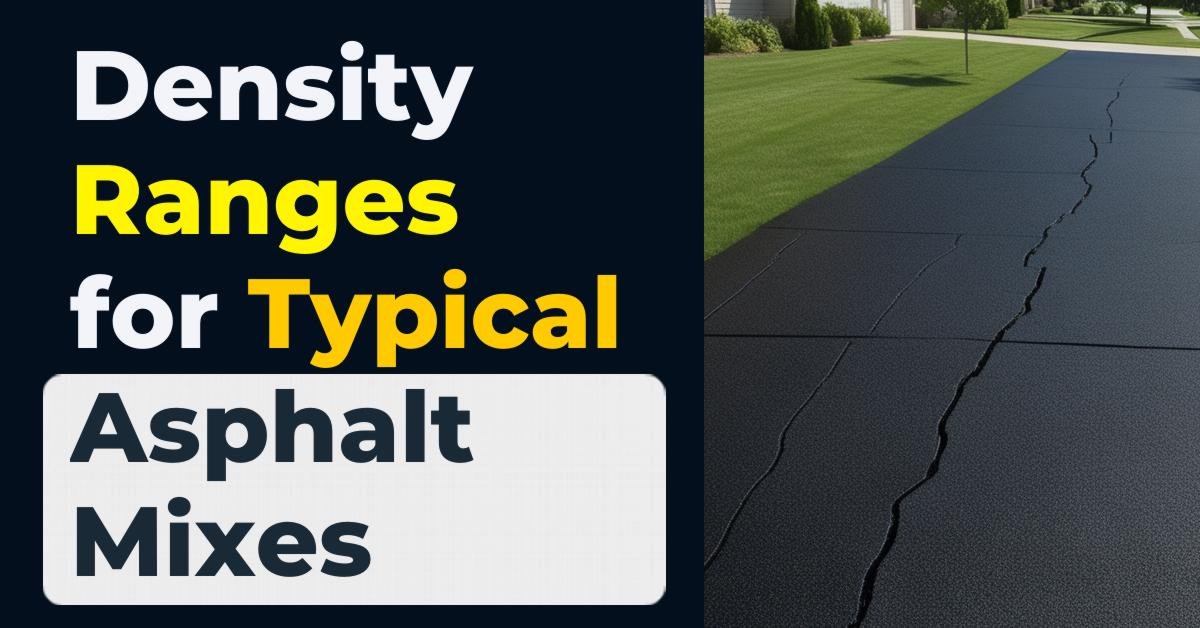The density of asphalt is a critical factor in determining its performance, durability, and suitability for different projects. Understanding the density range for different asphalt mixes helps ensure the right material is selected for each application, whether it’s for a highway, parking lot, or driveway. In this post, we’ll explore the typical density ranges of asphalt mixes and why these variations matter.
What is Asphalt Density?
Asphalt density refers to the mass of asphalt per unit volume, typically measured in pounds per cubic foot (lbs/ft³) or kilograms per cubic meter (kg/m³). The density affects how compact and strong the asphalt will be, and it directly impacts the amount of material required for a project. The density range for typical asphalt mixes generally falls between 2,200 to 2,400 kg/m³.
Why Density Matters
Density is important because it affects the load-bearing capacity, durability, and resistance to wear and tear. Projects with high traffic, heavy loads, or extreme weather conditions require asphalt with higher densities to withstand stress. On the other hand, areas where water drainage is critical may use lower-density asphalt to allow water to pass through.
Typical Density Ranges for Common Asphalt Mixes
Here are the typical density ranges for the most commonly used asphalt mixes:
| Asphalt Mix Type | Density (lbs/ft³) | Typical Use |
|---|---|---|
| Dense-Graded Asphalt | 140-145 | Roads, highways, heavy traffic areas |
| Porous Asphalt | 110-130 | Parking lots, residential areas with drainage |
| Stone Matrix Asphalt | 150-160 | Airports, areas with high stress |
| Hot Mix Asphalt (HMA) | 145-155 | Major roads and highways |
| Warm Mix Asphalt (WMA) | 135-145 | Cooler climates, lower compaction temperatures |
Each type of asphalt is specifically designed to meet certain performance standards based on its density.
Dense-Graded Asphalt (140-145 lbs/ft³)
Dense-graded asphalt is one of the most commonly used types of asphalt due to its versatility. Its high density makes it ideal for roads and highways that experience heavy traffic. The compact nature of the mix provides excellent strength, making it resistant to deformation and wear.
Porous Asphalt (110-130 lbs/ft³)
Porous asphalt is designed to allow water to pass through it, making it perfect for areas that need good drainage, like parking lots and residential driveways. The lower density of this mix creates voids, which are necessary for water to filter through and prevent surface pooling. However, its lower density means it’s not suitable for areas with heavy vehicle traffic.
Stone Matrix Asphalt (150-160 lbs/ft³)
For areas that experience high levels of stress, such as airports and industrial zones, stone matrix asphalt is preferred. It has a higher density, providing superior load-bearing capacity and durability. The strong aggregate structure within the mix helps it resist rutting and deformation under extreme pressure.
Hot Mix Asphalt (145-155 lbs/ft³)
Hot mix asphalt (HMA) is the go-to material for most roads and highways. It offers a balance between durability and ease of application. With a density range of 145-155 lbs/ft³, HMA is compacted at high temperatures, ensuring that it provides a stable, long-lasting surface that can handle a variety of environmental and traffic conditions.
Warm Mix Asphalt (135-145 lbs/ft³)
Similar to HMA, warm mix asphalt (WMA) is applied at lower temperatures. This makes it a more environmentally friendly option and ideal for cooler climates where temperature fluctuations could impact the compaction of other mixes. Though its density is slightly lower, WMA still performs well in most paving applications, making it a popular choice for energy-efficient projects.
Why Density Variations Matter
Choosing the right asphalt density for your project is critical because it influences several key factors:
- Load-bearing capacity: High-density mixes like stone matrix asphalt can handle heavier loads, while porous asphalt is better suited for lighter traffic.
- Durability: Dense-graded asphalt is resistant to cracking and deformation, making it perfect for high-traffic areas.
- Water drainage: Lower-density porous asphalt is designed to allow water to pass through, preventing water buildup and damage.
Making the wrong choice can lead to premature failure, cracking, or deformation in the asphalt, requiring costly repairs and replacements.
Conclusion: Choose the Right Density for Your Project
Understanding the density range of different asphalt mixes is crucial for selecting the right material for your project. Whether you need a high-density mix for a heavily trafficked highway or a porous mix for a parking lot, choosing the right asphalt ensures the surface will last longer and perform better. By selecting the right density for your specific needs, you can avoid issues like premature wear, deformation, and costly repairs.
